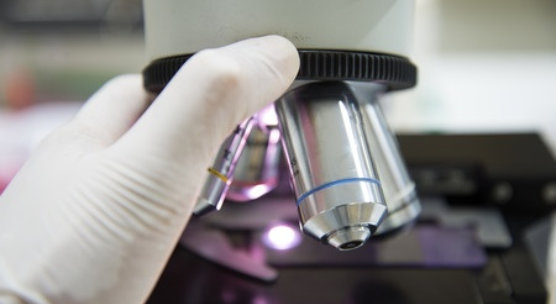Dundee contributing to €50m programme to develop new antibiotic treatments for cystic fibrosis and bronchiectasis
Published On Mon 7 Sep 2015 by Roddy Isles

The University of Dundee is contributing to a €50 million, Europe-wide, project to develop new drugs that could improve the lives of patients with cystic fibrosis and bronchiectasis.
The iABC (inhaled Antibiotics in Bronchiectasis and Cystic Fibrosis) consortium, which is made up of world-leading lung specialists from across Europe, will develop new ‘inhaled antibiotics’ to alleviate the symptoms of chronic lung infection, the main cause of disease and death in patients with cystic fibrosis and bronchiectasis.
The new antibiotics, which are to be trialled over a five year period and are being developed in response to an urgent need for new forms of inhaled antibiotics, are expected to improve patients’ quality of life by reducing lung infections and flare ups, improving lung function, and overcoming antibacterial resistance which frequently occurs in patients with these conditions.
The programme will also establish the first European patient register for bronchiectasis, providing a platform to improve the quality of care for patients across Europe, as well as making it easier to develop and trial new drugs.
The Consortium, which is led by researchers from the School of Medicine, Dentistry and Biomedical Sciences, and the School of Pharmacy, at Queen’s University, Belfast, with EFPIA partners Novartis and Basilea, is funded by the European Commission through the Innovative Medicines Initiative (IMI) and involves researchers from 20 organisations in seven countries across Europe.
The University of Dundee will lead the European Bronchiectasis register, which aims to recruit 10,000 patients with lung disease around Europe into clinical research studies. This work will take advantage of the cutting-edge informatics infrastructure available at Dundee through the Health Informatics Centre and the Farr Institute.
Dr James Chalmers from University of Dundee, one of the consortium workpackage leaders, said, “Bronchiectasis affects more than 50,000 patients in the UK and these patients urgently need better treatments. This project could be a turning point for the disease.”
Researchers at Dundee have been working in bronchiectasis research, an often neglected area, for many years but thus far there are no approved or licensed treatments. Dr Chalmers added, “What is so important about this project is that we are not just developing two new drugs, but also finding ways to make future trials successful and less costly.”
The iABC-consortium involves researchers from Northern Ireland, Scotland, England, Spain, Germany, France, Italy, Belgium, the Netherlands and Switzerland.
Notes to editors:
Cystic fibrosis (CF) is a genetic disease that blocks a person’s lungs and digestive system, affecting approximately 36,000 people in the European Union. More than 95% of deaths in patients with CF are due to respiratory failure. Bronchiectasis (BE) is a group of diseases in which a person’s airways become damaged and scarred. In developed countries, BE affects from 4 per 100 000 young adults to nearly 300 per 100,000 persons 75 years and older.
Organisations involved in the iABC consortium are: Queen’s University Belfast, Belfast Health and Social Care Trust, University Medical Center Utrecht, Fraunhofer-Gesellschaft zur Förderung der angewandten Forschung e.V. , Hannover, Rijksuniversiteit Groningen, Servicio Madrileño de Salud, Madrid, Universitair Ziekenhuis Antwerpen, University of Dundee, Institut National de la Santé et de la Recherche, Poitiers, Università degli Studi di Milano, Hospices Civils de Lyon, Medizinische Hochschule Hannover, Universiteit Antwerpen, University of Edinburgh, Royal Brompton and Harefield NHS Foundation Trust, Fundació Clínic per a la Recerca Biomèdica, Barcelona, Papworth Hospital NHS Foundation Trust, Erasmus Medical Center, Rotterdam, Basilea Pharmaceutica International Ltd, and Novartis Pharma AG, Basel.
IMI and ND4BB: In November 2011, the European Commission launched its Action Plan against the rising threat from Antimicrobial Resistance, and called for ‘unprecedented collaborative research and development efforts to bring new antibiotics to patients.’ The New Drugs for Bad Bugs (ND4BB) program was launched within the Innovative Medicine initiative (IMI) in direct response to this call. IMI is a joint undertaking between the European Union and the European Federation of Pharmaceutical Industries and Associations (EFPIA). It constitutes Europe's largest public-private initiative aiming to accelerate the development of better and safer medicines for patients. Find out more at www.imi.europa.eu
EFPIA: Brings together 33 European national pharmaceutical industry associations as well as 40 leading companies undertaking research, development and the manufacture in Europe of medicinal products for human use. Find out more at http://www.efpia.eu/
Roddy Isles
Head of Press
TEL: 01382 384910
MOBILE: 07800 581902
E-MAIL: r.isles@dundee.ac.uk